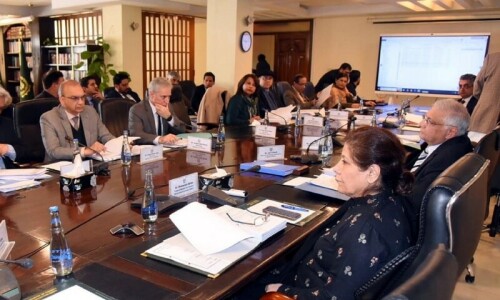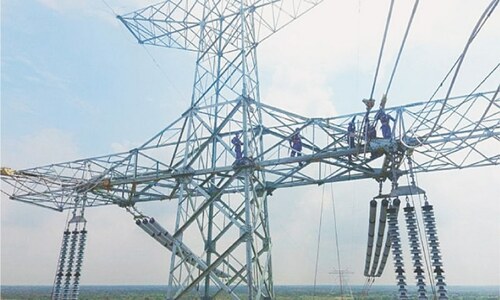ISLAMABAD: Amid ongoing engagement with the International Monetary Fund (IMF) for further electricity tariff reforms involving increases for residential and reductions for industrial consumers, the country’s power sector regulator, Nepra, has warned the government that its compulsions to pass on full costs coupled with historically highest inflationary spree in the country was diminishing the purchasing capacity of the consumers.
Last week, the caretakers shared with the IMF its plans to further ‘rationalise’ electricity prices through a reduction in subsidies for residential and agricultural consumers and tariff cuts for the industries before newly elected government sets in to revive economic activities.
In its latest annual report 2022-23, the National Electric Power Regulatory Authority (Nepra) highlighted that with a cumulative value exceeding Rs3.5 trillion in FY23, the power sector revenues constituted about 35pc of the country’s total budget which underscored the profound impact the power sector has on the nation’s economic landscape. “Given this pivotal role, the formulation of sound public policies and their implementation through a robust regulatory framework is of paramount importance,” it said, adding that Nepra was thus faced with the daunting task of striking a balance between the interests of the investors and the consumers.
The regulator pointed out that during FY23, the country’s power sector, “already replete with multiple issues including the huge capacity payment obligation, inefficiencies in the generation, transmission and distribution segments, whopping circular debt etc, faced unprecedented high cost for electric power services”. The unfortunate coincidence of an increase in the prices of imported fuel and the drastic rupee devaluation aggravated the challenge and jacked up the cost of generation.
At the same time, the economic compulsions also seriously impacted the government’s capacity to absorb increasing costs by way of subsidies.
In such an economic environment, the regulator said it was confronted with an uphill task of balancing between the service providers and the consumers. During the reporting year, the liquidity situation for the electric power sector and the affordability of electricity for consumers were aggravated due to an unprecedented increase in the cost of electricity. This price escalation emanated primarily due to to an increase in the prices of essential primary energy resources such as coal, oil, and gas in the international market and the drastic devaluation of the rupee which intensified the financial strain on the power sector and consumers.
The high cost of electricity in Pakistan has emerged as a critical challenge affecting all segments of society, ranging from domestic consumers to industrial and agricultural sectors. Amid the historically highest inflation in the country, the extraordinary increase in the price of electricity has badly disrupted the life of an ordinary man. Besides domestic consumers, the high price of electricity has had a major impact on commercial, industrial, agriculture and services sectors.
At the same time, the need for integrated planning held central importance for the objective development of the power sector in the short, medium and long run, it said and noted that the Indicative Generation Capacity Expansion Plan (IGCEP) was finally introduced in 2021 after a lot of procrastination followed by approval in FY23 of its second iteration covering the period 2022-31. This along with Transmission System Expansion Plan (TSEP) now gave a road map for future induction of generation capacity in tandem with transmission and distribution system expansion.
The regulator said it was deeply concerned about consumer satisfaction but emphasised that with the progress towards finalising the regulatory framework, development of planning documents and institutional arrangements, the stage was now set for the transition of the power sector from a traditional monopoly to a modern market-based structure working on the principles of competitions and efficiency.
Another significant factor contributing to the increased cost of electricity is the under-utilisation of ‘Take or Pay’ generation capacity, presenting a dual challenge to the power sector. Under ‘Take or Pay’ agreements, power utilities are obliged to pay for contracted capacity, regardless of whether it is consumed or not. The unutilised capacity placed a financial burden on electricity consumers, who end up paying for unused power.
During 2022-23, the utilisation factor of de-rated thermal electric power generation capacity remained less than 35pc. Additionally, non-optimal utilisation of capacity led to inefficiencies in the power generation process. This not only resulted in economic losses for power companies but also diminished the overall efficiency of the power sector. Use of less than available capacity, from power plants in operation, warrants payment of Part Load Adjustment Charges (PLAC) to generation companies which further escalates the per unit cost of electricity.
During 2022-23, the payment made to the power plants for PLAC, in the Central Power Purchasing Agency system amounted to Rs47bn.
Published in Dawn, February 9th, 2024












































